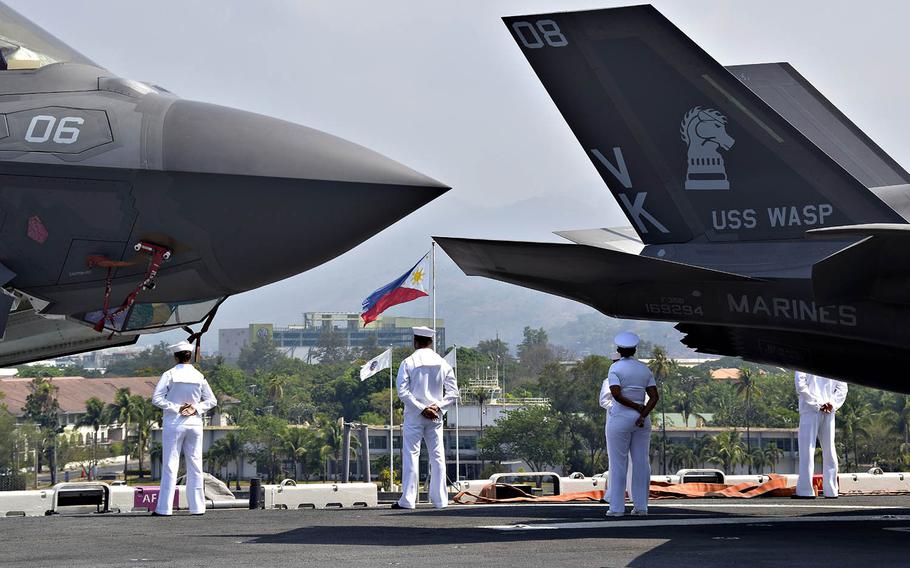
Sailors man the rails aboard the amphibious assault ship USS Wasp while arriving in Subic Bay, Philippines, for the Balikatan exercise, Saturday, March 30, 2019. (Daniel Barker/U.S. Navy)
The United States and the Philippines have kicked off Balikatan 2019, an annual military exercise involving thousands of troops and, for the first time, advanced F-35B Lightning II stealth fighters training in the Southeast Asian nation.
The drills, which are to include 4,000 Filipino, 3,500 American and 50 Australian troops, began Monday with a ceremony at Camp Aguinaldo in Quezon City and will run until April 12, according to local news reports.
During Balikatan, U.S. and Philippine forces will conduct amphibious operations, live-fire training, urban operations, aviation operations and counterterrorism response on the islands of Luzon and Palawan, the Defense Department said in a news release.
“Balikatan focuses on maritime security and amphibious capabilities, as well as multinational interoperability through military exchanges,” it said.
The F-35B is the Marine Corps’ short-takeoff, vertical-landing version of the joint strike fighter, designed for air support of Marines on the ground.
The Japan-based amphibious assault ship USS Wasp with F-35Bs and Marines on board from Special Purpose Marine Air Ground Task Force 4 — led by the 4th Marine Regiment — arrived Saturday in Subic Bay, the new release said.
“We are excited to visit the Philippines for the first time since Wasp was forward deployed to 7th Fleet,” the ship’s commander, Capt. Colby Howard, said in the release.
“Balikatan is a great opportunity for the Navy-Marine Corps team and our allies from the Republic of the Philippines to learn from one another, and further improve our ability to operate together,” he added.
Personnel from the Association of Southeast Asian Nations will observe this year’s exercise, the release said.
Australian Special Forces, medical, engineering and chaplaincy personnel would join the drills, the Australian Defense Force said in a statement.
“The exercise allows us to build our relationship with the Armed Forces of the Philippines and the United States Indo-Pacific Command,” the Australian chief of joint operations, Air Marshal Mel Hupfeld, said in the statement.
“Through this partnership, we aim to increase our ability to coordinate a multilateral response to a disaster or humanitarian crisis in a complex and ever-evolving regional security environment,” he said.
robson.seth@stripes.com Twitter: @SethRobson1